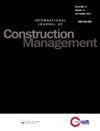Forecasting project success in the construction industry using adaptive neuro-fuzzy inference system
IF 3.4
Q2 CONSTRUCTION & BUILDING TECHNOLOGY
International Journal of Construction Management
Pub Date : 2023-10-14
DOI:10.1080/15623599.2023.2266676
引用次数: 1
Abstract
Project managers often find it a challenge to successfully manage construction projects. As a result, understanding, evaluating, and achieving project success are critical for sponsors to control projects. In practice, determining key success factors and criteria to assess the performance of construction projects and forecast the success of new projects is difficult. To address these concerns, our objective is to go beyond the efficiency-oriented project success criteria by considering both efficiency- and effectiveness-oriented measures to evaluate project success. This paper contributes to existing knowledge by identifying a holistic and multidimensional set of project success factors and criteria using a two-round Delphi technique. We developed a decision support system using the Adaptive Neuro-Fuzzy Inference System (ANFIS) to forecast the success of mid- and large-sized construction projects. We gathered data from 142 project managers in Australia and New Zealand to implement the developed ANFIS. We then validated the constructed ANFIS using the K-fold cross-validation procedure and a real case study of a large construction project in Western Australia. The forecasting accuracy measures R2=0.97461, MAPE = 2.57912%, MAE = 1.88425, RMSE = 2.3610, RRMSE = 0.03149, and PI = 0.01589 suggest that the developed ANFIS is a very good predictor of project success.应用自适应神经模糊推理系统预测建筑业项目成功
项目经理经常发现成功管理建设项目是一项挑战。因此,理解、评估和实现项目成功对于发起人控制项目是至关重要的。在实践中,确定关键的成功因素和标准来评估建设项目的绩效和预测新项目的成功是困难的。为了解决这些问题,我们的目标是通过考虑以效率和有效性为导向的方法来评估项目成功,从而超越以效率为导向的项目成功标准。本文通过使用两轮德尔菲技术确定项目成功因素和标准的整体和多维集,为现有知识做出贡献。我们开发了一个决策支持系统,利用自适应神经模糊推理系统(ANFIS)来预测中大型建设项目的成功。我们从澳大利亚和新西兰的142个项目经理那里收集了数据,以实施开发的ANFIS。然后,我们使用K-fold交叉验证程序和西澳大利亚州一个大型建筑项目的真实案例研究验证了构建的ANFIS。预测精度指标R2=0.97461, MAPE = 2.57912%, MAE = 1.88425, RMSE = 2.3610, RRMSE = 0.03149, PI = 0.01589表明开发的ANFIS可以很好地预测项目成功。
本文章由计算机程序翻译,如有差异,请以英文原文为准。
求助全文
约1分钟内获得全文
求助全文
来源期刊

International Journal of Construction Management
MANAGEMENT-
CiteScore
8.60
自引率
17.90%
发文量
112
期刊介绍:
The International Journal of Construction Management publishes quality papers aiming to advance the knowledge of construction management. The Journal is devoted to the publication of original research including, but not limited to the following: Sustainable Construction (Green building; Carbon emission; Waste management; Energy saving) Construction life cycle management Construction informatics (Building information modelling; Information communication technology; Virtual design and construction) Smart construction (Robotics; Artificial intelligence; 3D printing) Big data for construction Legal issues in construction Public policies for construction Building and Infrastructures Health, safety and well-being in construction Risk management in construction Disaster management and resilience Construction procurement Construction management education
 求助内容:
求助内容: 应助结果提醒方式:
应助结果提醒方式:


